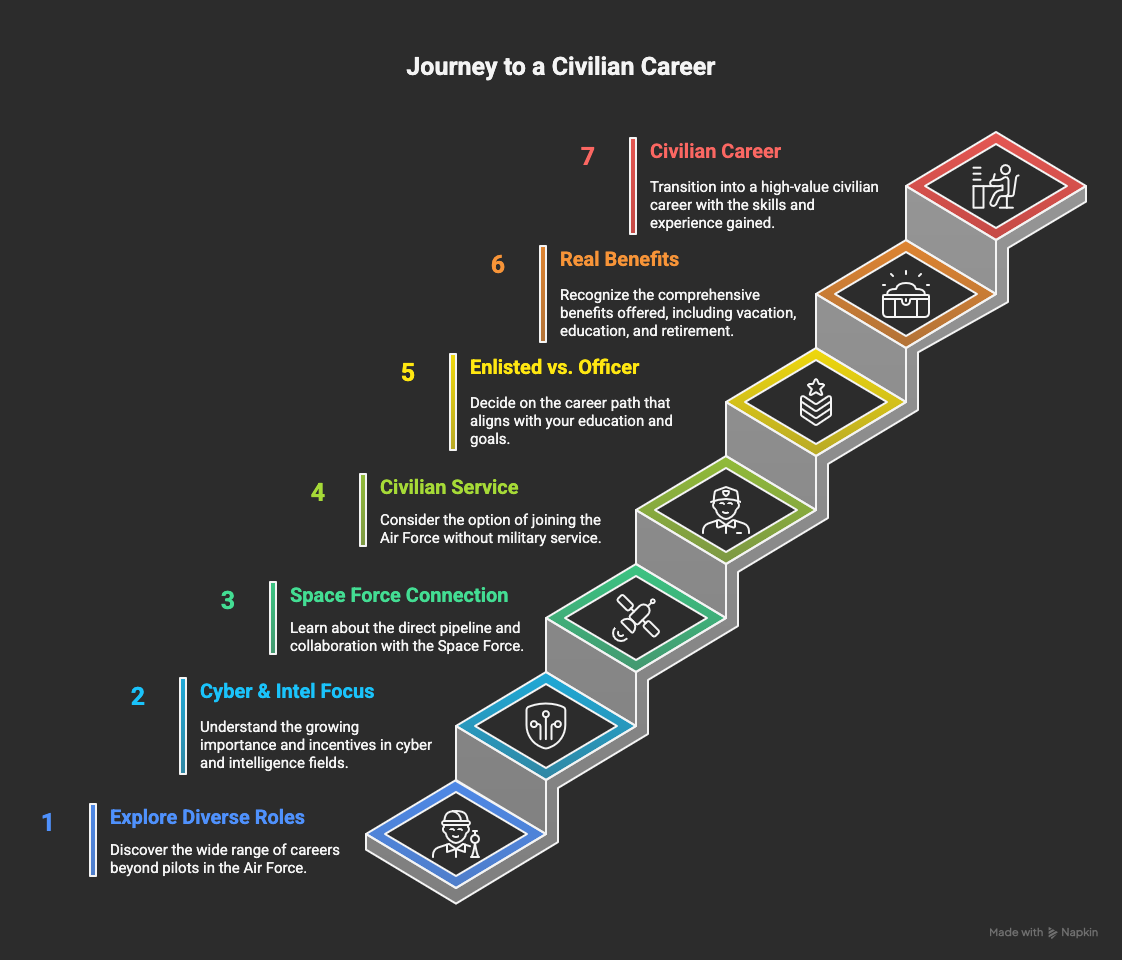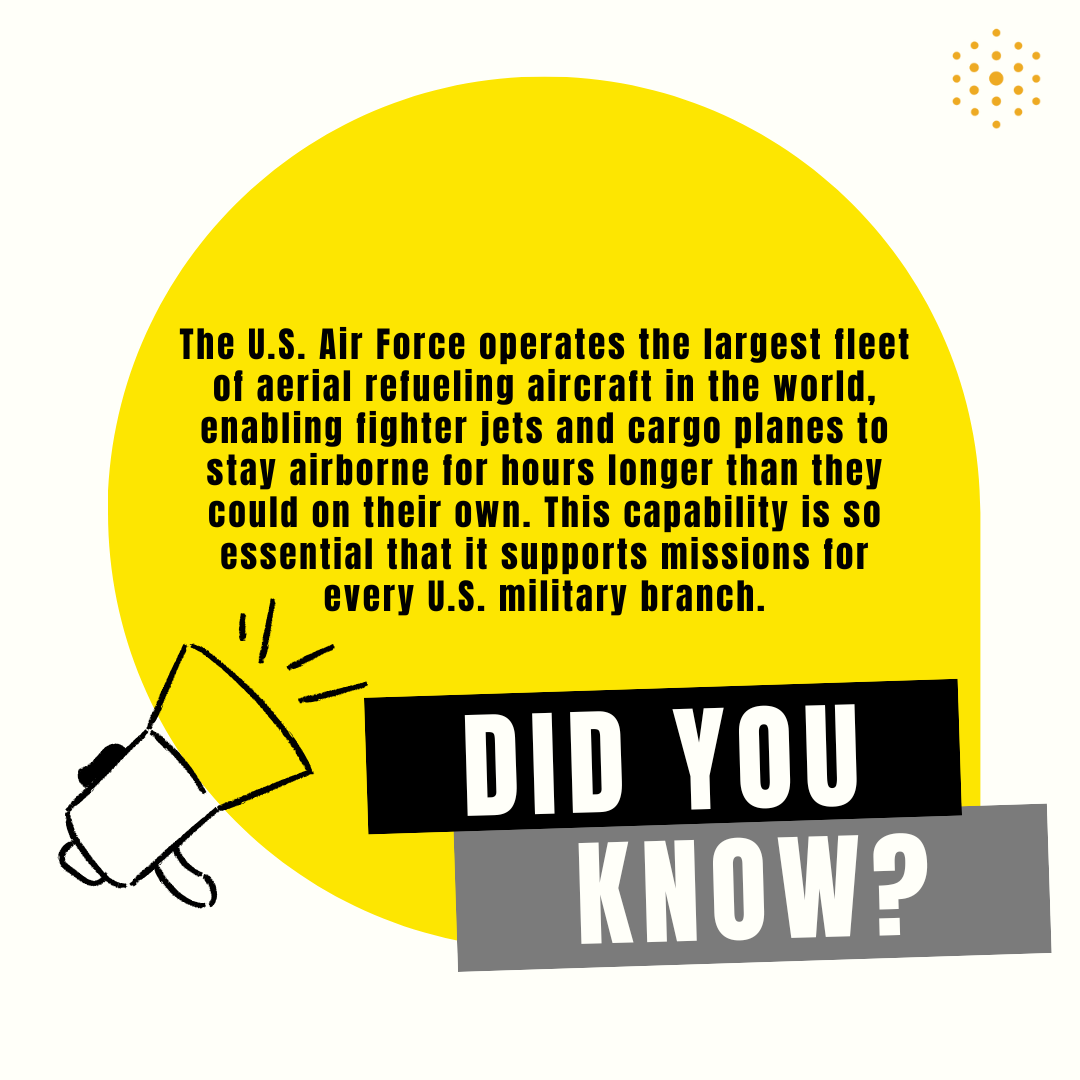What should you really know about Air Force careers?
The Air Force is far more than jets and pilots — it’s a vast ecosystem of over 130 careers across cyber, healthcare, logistics, intelligence, and even civilian service. With paths into the Space Force, six-figure tech roles, and unmatched education and retirement benefits, Air Force careers offer training and advancement that last well beyond service. The key is understanding your options — enlisted, officer, or civilian — and how to position your experience for long-term success.
When you hear “Air Force,” you probably think of pilots in jets. That’s a huge part of the mission, but it’s only one piece of a massive puzzle.
The U.S. Air Force offers over 130 enlisted careers, and that’s before you even count officer and civilian roles.
In practice, the Air Force functions like a self-sustaining city with its own hospital system, police force, cyber and intel teams, engineers, lawyers, logistics network, and even a direct pipeline into the Space Force.
If you’re seriously considering the Air Force jobs, you need more than a recruiting poster.
You need to understand what kinds of jobs actually exist, how you qualify for them (enlisted vs. officer, military vs. civilian), and what those roles turn into when you transition to the civilian world.
So let’s get into the specifics you won’t see on a billboard - starting with the biggest misconception: that it’s all about planes and pilots.
1. It’s Not Just Planes and Pilots
The Air Force is essentially a self-sustaining city with a massive aviation branch. It needs professionals in every field imaginable.
While "Aviation and Flight" is a key category, the U.S. Air Force official career site shows that "Healthcare," "Cyber and Intelligence," "Logistics and Administration," and "Science and Technology" are all massive career fields.
Think about it: an air base needs doctors, nurses, and pharmacists.
It needs lawyers (the Judge Advocate General's Corps, or JAG) and law enforcement (Security Forces). It needs logistics managers to move everything from jet engines to medical supplies.
These are all critical, full-time Air Force jobs.
2. The Cyber & Intel "Gold Rush" is Real (With Big Bonuses)
The future of defense is digital, and the Air Force is aggressively hiring for it. If you have any interest in technology, this is your fast track.
Plus, careers in "Cyber and Intelligence" are heavily incentivized.
The Air Force is currently offering bonuses up to $40,000 for specific, high-demand jobs, according to the official U.S. Air Force recruiting site.
Many of these fall into cyber and intel. We’re talking about roles like:
- Cyber Warfare Operations (1B4X1): These are the "digital warriors" who defend Air Force networks and conduct offensive cyber operations.
- Cryptologic Language Analyst (1N3X1): This job involves learning a critical language (like Chinese, Russian, or Farsi) to analyze foreign communications.
Landing one of these roles means getting some of the most advanced (and expensive) technical skills training in the world, all while getting paid.

3. You Might Actually Work for the Space Force
This is a new and critical point many people miss. The U.S. Space Force (USSF) is a separate service, but it is "developed, operated, and defended" by professionals who are often sourced directly from the Air Force, according to the U.S. Space Force.
Many high-tech Air Force jobs have a direct pipeline or work in tandem with the Space Force mission. When you look at Air Force careers, you'll see roles like:
- Space Systems Operations (1C6X1): You’re not flying a spaceship, but you are tracking satellites, detecting missile launches, and monitoring space debris.
- Developmental Engineer (Officer): These officers manage the design, testing, and implementation of cutting-edge space technology, from new satellites to rocket systems.
If your goal is to work in the space domain, your most direct path often starts with an Air Force recruiter.
4. You Can Be "in" the Air Force Without a Uniform
Want the stability and mission of the Air Force but not the military lifestyle? Look into the Air Force Civilian Service (AFCS).
The AFCS employs over 170,000 civilians in the same critical fields as their uniformed counterparts - from cybersecurity and engineering to financial management and childcare.
Here’s the actionable part: The AFCS frequently uses "Direct Hire Authorities (DHA)" to fill mission-critical positions, according to the AFCS job site.
This authority allows them to streamline the application process and hire qualified candidates much faster than traditional government hiring.
This is a fantastic "back door" into a stable, high-impact government career.
5. "How" You Join Matters: Enlisted vs. Officer
This is the single most important decision you'll make. It dictates your pay, training, and career path.
- Enlisted: This is the path for ~80% of the Air Force. You can join with a high school diploma. You will be the hands-on expert - the aircraft mechanic, the cyber analyst, the medical technician. You do the work.
- Officer: This path requires a four-year college degree. Officers are the leaders and managers. An engineer officer won't be drafting the plans, but they will be leading the team of engineers who do. If you have a B.S. in a STEM field, you should be asking your recruiter about becoming an officer.
Your approach to getting these roles is different, too.
Applying for an officer slot, for example, is more like a professional job interview, where you'll need to demonstrate your leadership and management potential.

6. The Real Benefits Are Better Than You Think
Recruiters talk about benefits, but let's put hard numbers on them.
- Vacation: You get 30 days of paid vacation every single year, according to the official Air Force benefits page. That's in addition to federal holidays. Most civilian jobs start you with 10-15 days.
- Education: The Air Force Tuition Assistance Program provides up to 100% tuition coverage (with a cap) for courses taken while you're on active duty. You can genuinely get a bachelor's or master's degree for free while you work.
- Retirement: The old pension-or-nothing system is gone. The military now uses the Blended Retirement System (BRS). It’s like a 401(k): you contribute to a Thrift Savings Plan (TSP), and the government matches your contributions up to 5% of your basic pay after your first two years. You can take this with you even if you leave before 20 years.
7. It's a Direct Path to a Six-Figure Civilian Career
The experience you gain in the Air Force is not just "military experience"; it's direct, verifiable job experience.
A four-year contract as a Cyber Warfare Operations specialist is the equivalent of a $100k+ cybersecurity boot camp and four years of experience at a high-stakes tech company.
When you decide to leave the service, you are a top-tier candidate for defense contractors and civilian tech companies.
The key is knowing how to translate your experience. Your service record, performance reports, and training certificates are the proof.
You have to reframe "Led a 5-person fire team" into "Managed a cross-functional team of five personnel to execute time-sensitive security operations."
Wrapping Up
The Air Force isn’t just about flying - it’s one of the most skill-diverse career ecosystems in the country.
Whether you’re looking at cyber, healthcare, intelligence, engineering, logistics, or civilian service, each path comes with real training, real responsibility, and real long-term career value.
The key is knowing how to position yourself at every stage, from applying to advancing to transitioning into high-value civilian roles.
If you ever need help turning that experience into a clear, polished resume, or cover letter, or preparing for interviews after service, Hiration can guide you.
In the end, every Air Force career track offers real growth, real training, and real opportunities both inside and beyond the military.
Air Force Careers — FAQ
Is the Air Force only about flying?
No. While aviation is central, the Air Force employs professionals in over 130 roles including cyber, healthcare, logistics, intelligence, and legal services — it operates like a full-scale city.
Which Air Force jobs are most in demand right now?
Cybersecurity and intelligence roles top the list, with bonuses up to $40,000 for high-skill areas such as Cyber Warfare Operations and Cryptologic Language Analysis.
Can I work in the Space Force through the Air Force?
Yes. Many high-tech Air Force specialties like Space Systems Operations and Developmental Engineering directly support Space Force missions, creating clear transition pathways.
What if I don’t want to enlist?
You can join the Air Force Civilian Service (AFCS), which employs over 170,000 civilians across engineering, cybersecurity, logistics, and more — often through streamlined Direct Hire Authorities.
What’s the difference between enlisted and officer paths?
Enlisted roles are hands-on technical positions, typically open to those with a high school diploma. Officers are managers and leaders who need a four-year degree, especially in STEM or management fields.
What benefits make Air Force careers stand out?
Airmen receive 30 days of paid vacation, full tuition assistance, and a Blended Retirement System with 5% government matching — plus access to federal healthcare and housing benefits.
How can Air Force experience lead to civilian success?
Experience in fields like cyber, logistics, and engineering translates directly into six-figure civilian careers. The key is learning how to frame your service accomplishments for private-sector employers.
How can Hiration help transitioning Airmen?
Hiration’s AI platform helps you translate military experience into civilian-ready resumes, cover letters, and LinkedIn profiles — positioning you for high-value jobs post-service.



